University Nursing Essay: Time Management and Professional Practice
VerifiedAdded on 2023/04/08
|17
|4671
|237
Essay
AI Summary
This essay provides a reflective analysis of time management in nursing practice. The student identifies a personal learning need related to time management, highlighting challenges faced during clinical placements, such as prioritizing tasks, managing patient needs, and dealing with stress. The essay critically evaluates the student's professional practice against the NMC Code, specifically addressing the impact of poor time management on patient safety and adherence to ethical principles like beneficence and non-maleficence. It analyzes the knowledge, skills, and competencies required for effective leadership, management, and teamwork, emphasizing prioritization, delegation, and conflict resolution. The essay draws upon relevant literature to support the analysis and discusses the importance of time management in preventing adverse patient outcomes and fostering a positive work environment. The student also includes a reflective account and a personal action plan, which are attached as appendices.
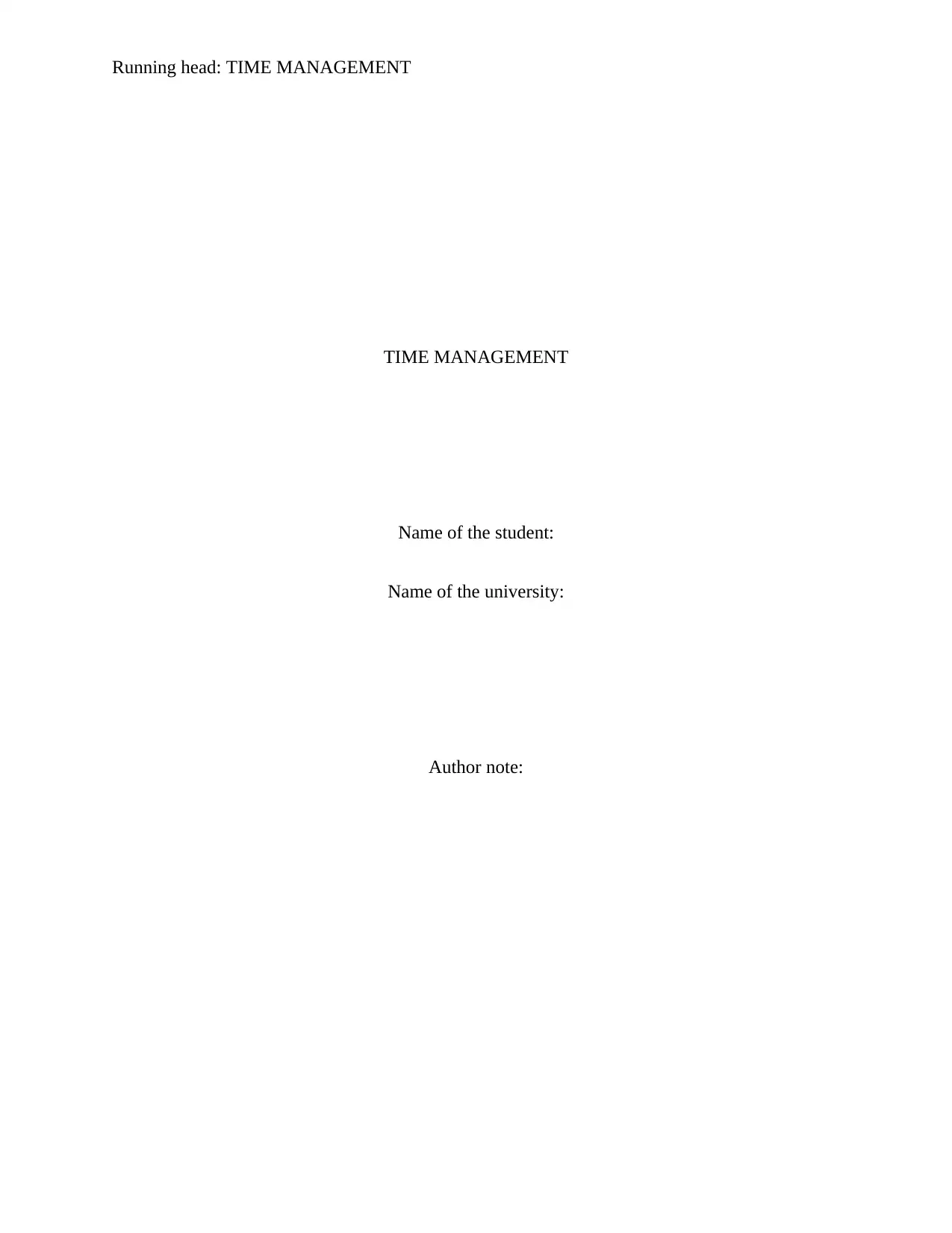
Running head: TIME MANAGEMENT
TIME MANAGEMENT
Name of the student:
Name of the university:
Author note:
TIME MANAGEMENT
Name of the student:
Name of the university:
Author note:
Paraphrase This Document
Need a fresh take? Get an instant paraphrase of this document with our AI Paraphraser
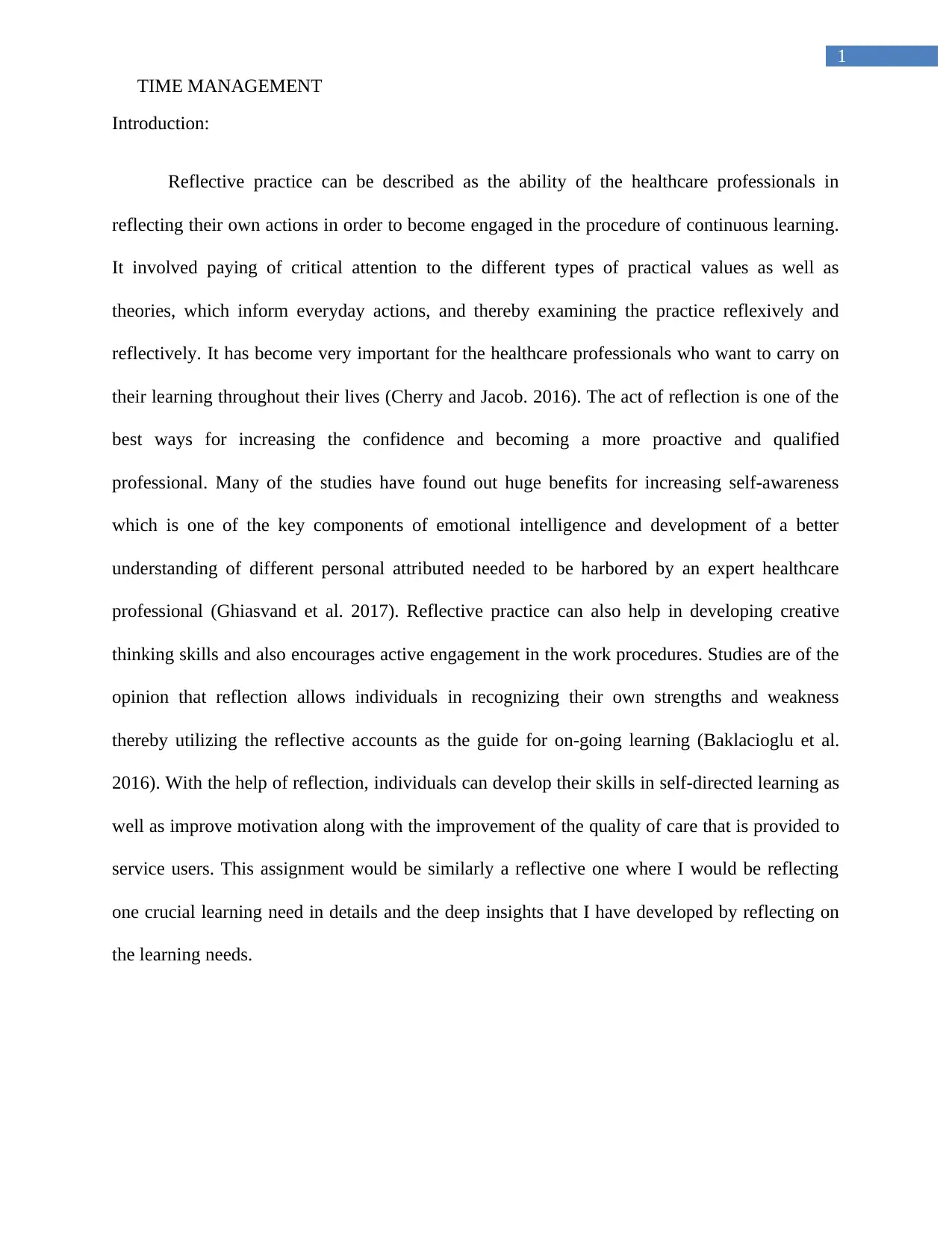
1
TIME MANAGEMENT
Introduction:
Reflective practice can be described as the ability of the healthcare professionals in
reflecting their own actions in order to become engaged in the procedure of continuous learning.
It involved paying of critical attention to the different types of practical values as well as
theories, which inform everyday actions, and thereby examining the practice reflexively and
reflectively. It has become very important for the healthcare professionals who want to carry on
their learning throughout their lives (Cherry and Jacob. 2016). The act of reflection is one of the
best ways for increasing the confidence and becoming a more proactive and qualified
professional. Many of the studies have found out huge benefits for increasing self-awareness
which is one of the key components of emotional intelligence and development of a better
understanding of different personal attributed needed to be harbored by an expert healthcare
professional (Ghiasvand et al. 2017). Reflective practice can also help in developing creative
thinking skills and also encourages active engagement in the work procedures. Studies are of the
opinion that reflection allows individuals in recognizing their own strengths and weakness
thereby utilizing the reflective accounts as the guide for on-going learning (Baklacioglu et al.
2016). With the help of reflection, individuals can develop their skills in self-directed learning as
well as improve motivation along with the improvement of the quality of care that is provided to
service users. This assignment would be similarly a reflective one where I would be reflecting
one crucial learning need in details and the deep insights that I have developed by reflecting on
the learning needs.
TIME MANAGEMENT
Introduction:
Reflective practice can be described as the ability of the healthcare professionals in
reflecting their own actions in order to become engaged in the procedure of continuous learning.
It involved paying of critical attention to the different types of practical values as well as
theories, which inform everyday actions, and thereby examining the practice reflexively and
reflectively. It has become very important for the healthcare professionals who want to carry on
their learning throughout their lives (Cherry and Jacob. 2016). The act of reflection is one of the
best ways for increasing the confidence and becoming a more proactive and qualified
professional. Many of the studies have found out huge benefits for increasing self-awareness
which is one of the key components of emotional intelligence and development of a better
understanding of different personal attributed needed to be harbored by an expert healthcare
professional (Ghiasvand et al. 2017). Reflective practice can also help in developing creative
thinking skills and also encourages active engagement in the work procedures. Studies are of the
opinion that reflection allows individuals in recognizing their own strengths and weakness
thereby utilizing the reflective accounts as the guide for on-going learning (Baklacioglu et al.
2016). With the help of reflection, individuals can develop their skills in self-directed learning as
well as improve motivation along with the improvement of the quality of care that is provided to
service users. This assignment would be similarly a reflective one where I would be reflecting
one crucial learning need in details and the deep insights that I have developed by reflecting on
the learning needs.
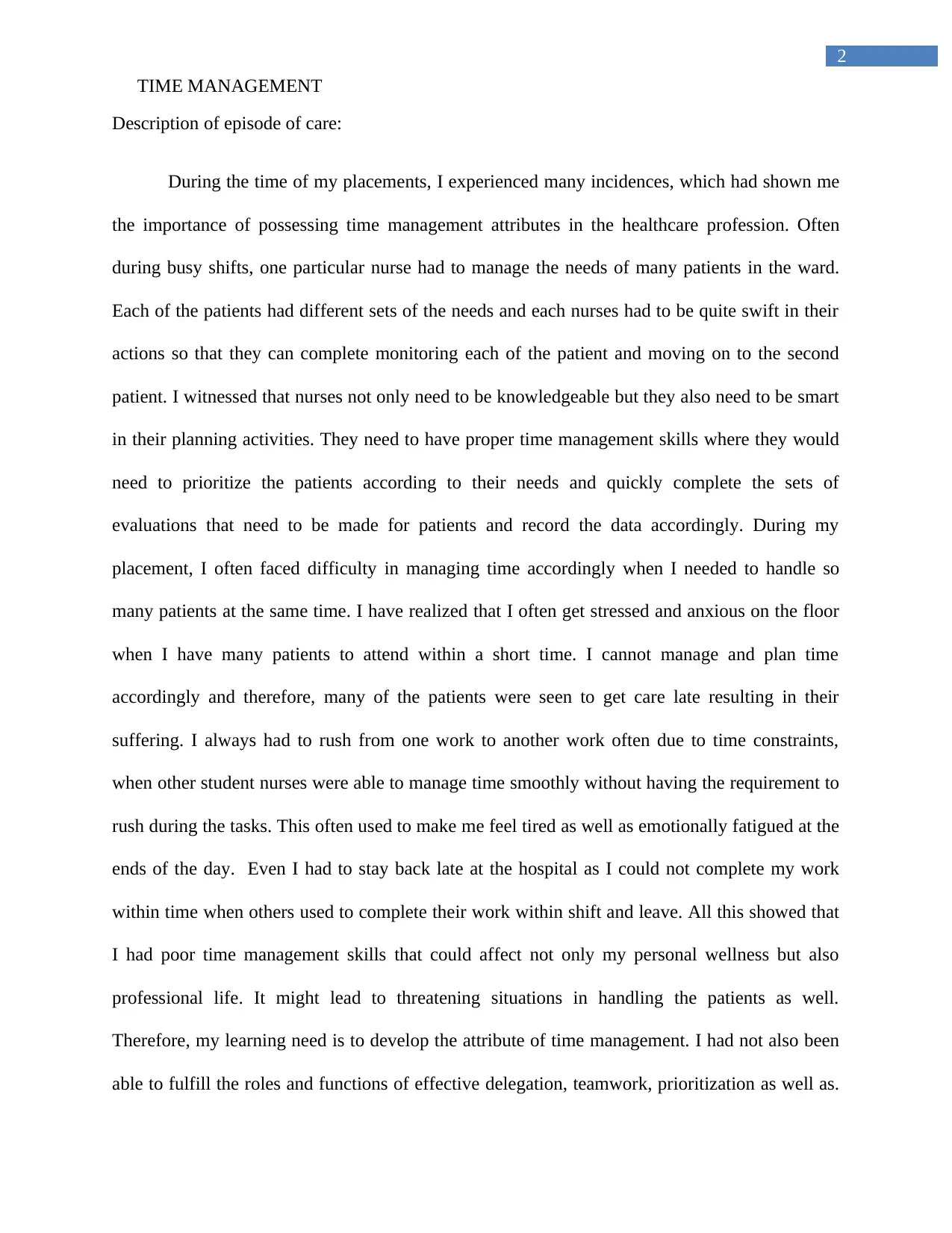
2
TIME MANAGEMENT
Description of episode of care:
During the time of my placements, I experienced many incidences, which had shown me
the importance of possessing time management attributes in the healthcare profession. Often
during busy shifts, one particular nurse had to manage the needs of many patients in the ward.
Each of the patients had different sets of the needs and each nurses had to be quite swift in their
actions so that they can complete monitoring each of the patient and moving on to the second
patient. I witnessed that nurses not only need to be knowledgeable but they also need to be smart
in their planning activities. They need to have proper time management skills where they would
need to prioritize the patients according to their needs and quickly complete the sets of
evaluations that need to be made for patients and record the data accordingly. During my
placement, I often faced difficulty in managing time accordingly when I needed to handle so
many patients at the same time. I have realized that I often get stressed and anxious on the floor
when I have many patients to attend within a short time. I cannot manage and plan time
accordingly and therefore, many of the patients were seen to get care late resulting in their
suffering. I always had to rush from one work to another work often due to time constraints,
when other student nurses were able to manage time smoothly without having the requirement to
rush during the tasks. This often used to make me feel tired as well as emotionally fatigued at the
ends of the day. Even I had to stay back late at the hospital as I could not complete my work
within time when others used to complete their work within shift and leave. All this showed that
I had poor time management skills that could affect not only my personal wellness but also
professional life. It might lead to threatening situations in handling the patients as well.
Therefore, my learning need is to develop the attribute of time management. I had not also been
able to fulfill the roles and functions of effective delegation, teamwork, prioritization as well as.
TIME MANAGEMENT
Description of episode of care:
During the time of my placements, I experienced many incidences, which had shown me
the importance of possessing time management attributes in the healthcare profession. Often
during busy shifts, one particular nurse had to manage the needs of many patients in the ward.
Each of the patients had different sets of the needs and each nurses had to be quite swift in their
actions so that they can complete monitoring each of the patient and moving on to the second
patient. I witnessed that nurses not only need to be knowledgeable but they also need to be smart
in their planning activities. They need to have proper time management skills where they would
need to prioritize the patients according to their needs and quickly complete the sets of
evaluations that need to be made for patients and record the data accordingly. During my
placement, I often faced difficulty in managing time accordingly when I needed to handle so
many patients at the same time. I have realized that I often get stressed and anxious on the floor
when I have many patients to attend within a short time. I cannot manage and plan time
accordingly and therefore, many of the patients were seen to get care late resulting in their
suffering. I always had to rush from one work to another work often due to time constraints,
when other student nurses were able to manage time smoothly without having the requirement to
rush during the tasks. This often used to make me feel tired as well as emotionally fatigued at the
ends of the day. Even I had to stay back late at the hospital as I could not complete my work
within time when others used to complete their work within shift and leave. All this showed that
I had poor time management skills that could affect not only my personal wellness but also
professional life. It might lead to threatening situations in handling the patients as well.
Therefore, my learning need is to develop the attribute of time management. I had not also been
able to fulfill the roles and functions of effective delegation, teamwork, prioritization as well as.
⊘ This is a preview!⊘
Do you want full access?
Subscribe today to unlock all pages.

Trusted by 1+ million students worldwide
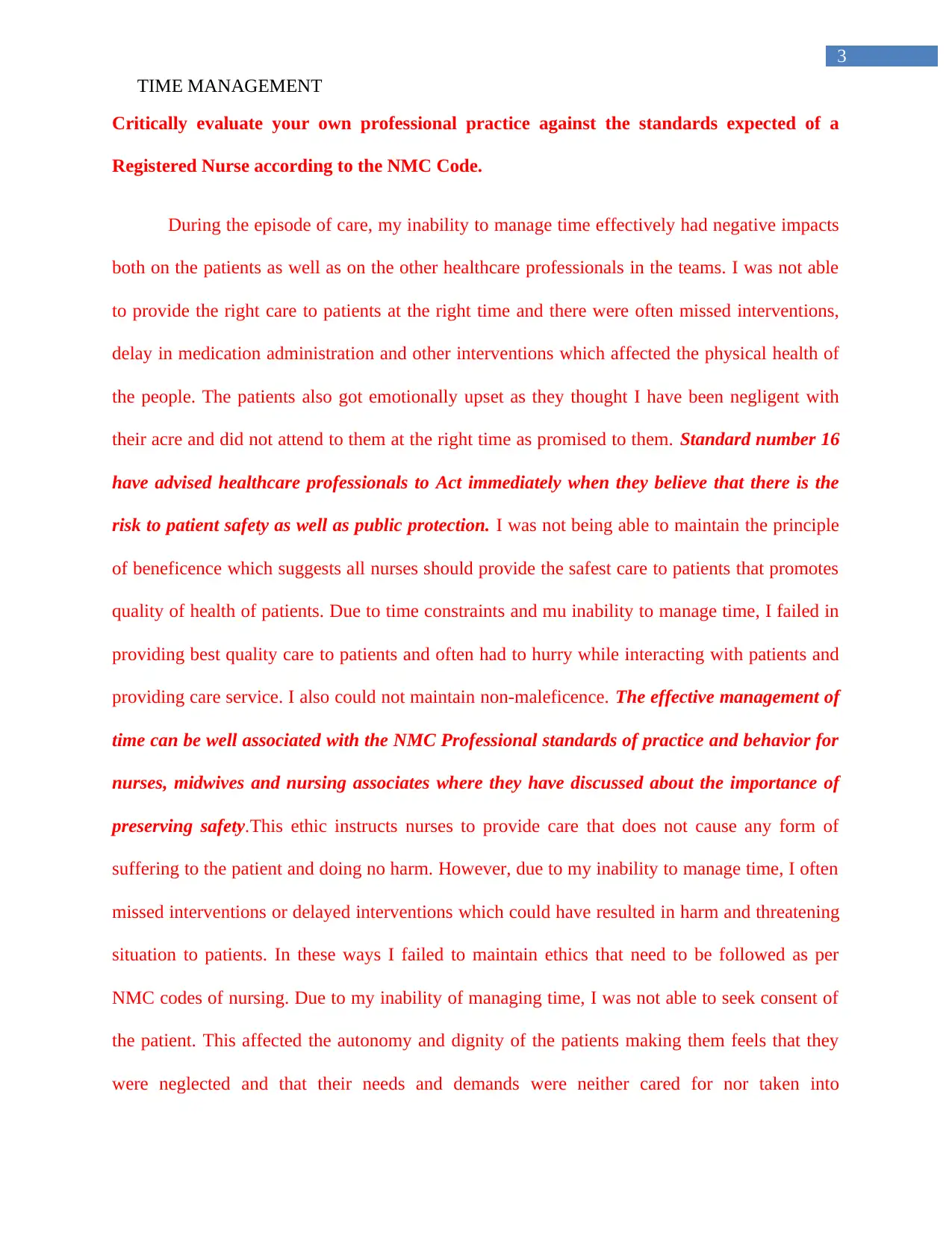
3
TIME MANAGEMENT
Critically evaluate your own professional practice against the standards expected of a
Registered Nurse according to the NMC Code.
During the episode of care, my inability to manage time effectively had negative impacts
both on the patients as well as on the other healthcare professionals in the teams. I was not able
to provide the right care to patients at the right time and there were often missed interventions,
delay in medication administration and other interventions which affected the physical health of
the people. The patients also got emotionally upset as they thought I have been negligent with
their acre and did not attend to them at the right time as promised to them. Standard number 16
have advised healthcare professionals to Act immediately when they believe that there is the
risk to patient safety as well as public protection. I was not being able to maintain the principle
of beneficence which suggests all nurses should provide the safest care to patients that promotes
quality of health of patients. Due to time constraints and mu inability to manage time, I failed in
providing best quality care to patients and often had to hurry while interacting with patients and
providing care service. I also could not maintain non-maleficence. The effective management of
time can be well associated with the NMC Professional standards of practice and behavior for
nurses, midwives and nursing associates where they have discussed about the importance of
preserving safety.This ethic instructs nurses to provide care that does not cause any form of
suffering to the patient and doing no harm. However, due to my inability to manage time, I often
missed interventions or delayed interventions which could have resulted in harm and threatening
situation to patients. In these ways I failed to maintain ethics that need to be followed as per
NMC codes of nursing. Due to my inability of managing time, I was not able to seek consent of
the patient. This affected the autonomy and dignity of the patients making them feels that they
were neglected and that their needs and demands were neither cared for nor taken into
TIME MANAGEMENT
Critically evaluate your own professional practice against the standards expected of a
Registered Nurse according to the NMC Code.
During the episode of care, my inability to manage time effectively had negative impacts
both on the patients as well as on the other healthcare professionals in the teams. I was not able
to provide the right care to patients at the right time and there were often missed interventions,
delay in medication administration and other interventions which affected the physical health of
the people. The patients also got emotionally upset as they thought I have been negligent with
their acre and did not attend to them at the right time as promised to them. Standard number 16
have advised healthcare professionals to Act immediately when they believe that there is the
risk to patient safety as well as public protection. I was not being able to maintain the principle
of beneficence which suggests all nurses should provide the safest care to patients that promotes
quality of health of patients. Due to time constraints and mu inability to manage time, I failed in
providing best quality care to patients and often had to hurry while interacting with patients and
providing care service. I also could not maintain non-maleficence. The effective management of
time can be well associated with the NMC Professional standards of practice and behavior for
nurses, midwives and nursing associates where they have discussed about the importance of
preserving safety.This ethic instructs nurses to provide care that does not cause any form of
suffering to the patient and doing no harm. However, due to my inability to manage time, I often
missed interventions or delayed interventions which could have resulted in harm and threatening
situation to patients. In these ways I failed to maintain ethics that need to be followed as per
NMC codes of nursing. Due to my inability of managing time, I was not able to seek consent of
the patient. This affected the autonomy and dignity of the patients making them feels that they
were neglected and that their needs and demands were neither cared for nor taken into
Paraphrase This Document
Need a fresh take? Get an instant paraphrase of this document with our AI Paraphraser
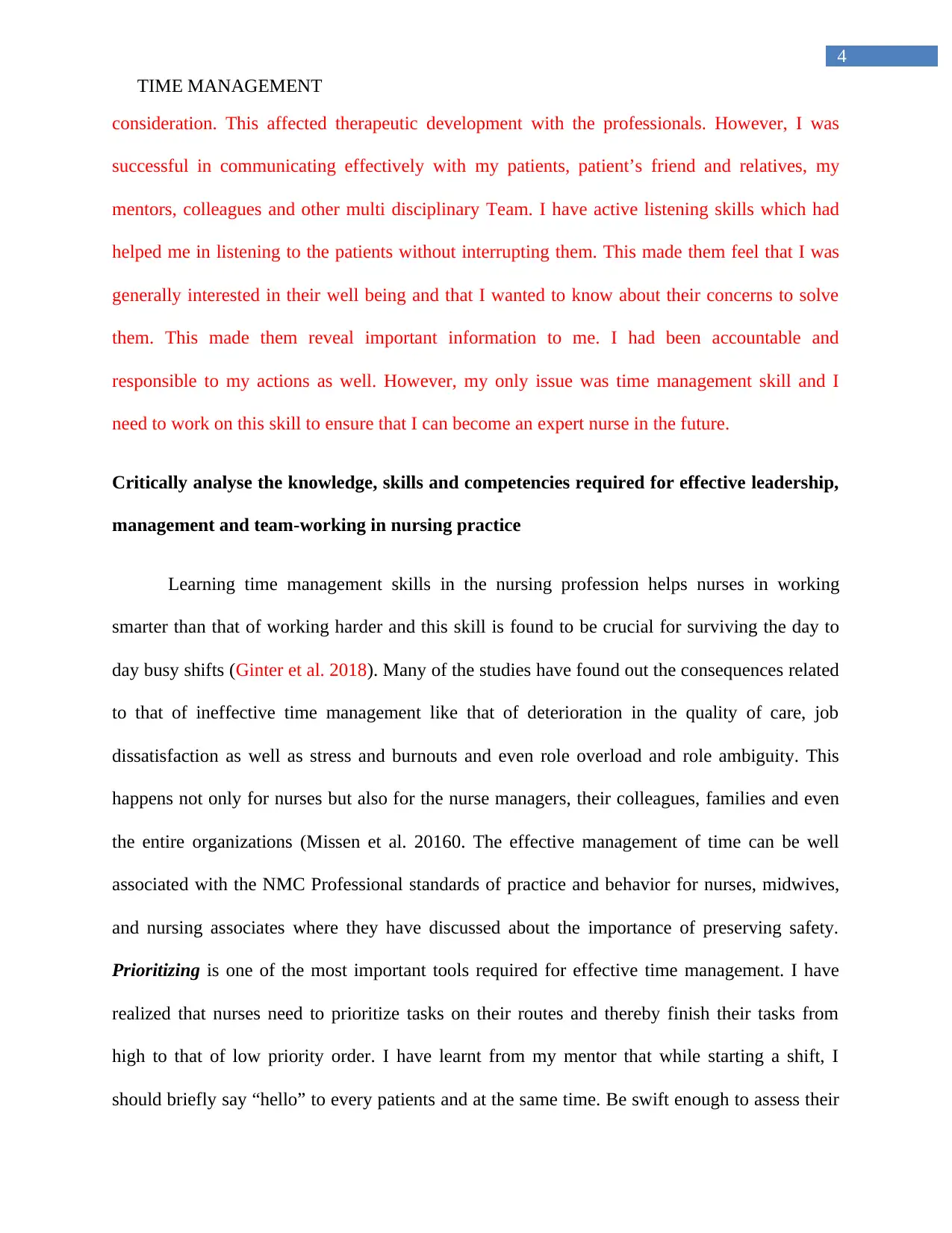
4
TIME MANAGEMENT
consideration. This affected therapeutic development with the professionals. However, I was
successful in communicating effectively with my patients, patient’s friend and relatives, my
mentors, colleagues and other multi disciplinary Team. I have active listening skills which had
helped me in listening to the patients without interrupting them. This made them feel that I was
generally interested in their well being and that I wanted to know about their concerns to solve
them. This made them reveal important information to me. I had been accountable and
responsible to my actions as well. However, my only issue was time management skill and I
need to work on this skill to ensure that I can become an expert nurse in the future.
Critically analyse the knowledge, skills and competencies required for effective leadership,
management and team-working in nursing practice
Learning time management skills in the nursing profession helps nurses in working
smarter than that of working harder and this skill is found to be crucial for surviving the day to
day busy shifts (Ginter et al. 2018). Many of the studies have found out the consequences related
to that of ineffective time management like that of deterioration in the quality of care, job
dissatisfaction as well as stress and burnouts and even role overload and role ambiguity. This
happens not only for nurses but also for the nurse managers, their colleagues, families and even
the entire organizations (Missen et al. 20160. The effective management of time can be well
associated with the NMC Professional standards of practice and behavior for nurses, midwives,
and nursing associates where they have discussed about the importance of preserving safety.
Prioritizing is one of the most important tools required for effective time management. I have
realized that nurses need to prioritize tasks on their routes and thereby finish their tasks from
high to that of low priority order. I have learnt from my mentor that while starting a shift, I
should briefly say “hello” to every patients and at the same time. Be swift enough to assess their
TIME MANAGEMENT
consideration. This affected therapeutic development with the professionals. However, I was
successful in communicating effectively with my patients, patient’s friend and relatives, my
mentors, colleagues and other multi disciplinary Team. I have active listening skills which had
helped me in listening to the patients without interrupting them. This made them feel that I was
generally interested in their well being and that I wanted to know about their concerns to solve
them. This made them reveal important information to me. I had been accountable and
responsible to my actions as well. However, my only issue was time management skill and I
need to work on this skill to ensure that I can become an expert nurse in the future.
Critically analyse the knowledge, skills and competencies required for effective leadership,
management and team-working in nursing practice
Learning time management skills in the nursing profession helps nurses in working
smarter than that of working harder and this skill is found to be crucial for surviving the day to
day busy shifts (Ginter et al. 2018). Many of the studies have found out the consequences related
to that of ineffective time management like that of deterioration in the quality of care, job
dissatisfaction as well as stress and burnouts and even role overload and role ambiguity. This
happens not only for nurses but also for the nurse managers, their colleagues, families and even
the entire organizations (Missen et al. 20160. The effective management of time can be well
associated with the NMC Professional standards of practice and behavior for nurses, midwives,
and nursing associates where they have discussed about the importance of preserving safety.
Prioritizing is one of the most important tools required for effective time management. I have
realized that nurses need to prioritize tasks on their routes and thereby finish their tasks from
high to that of low priority order. I have learnt from my mentor that while starting a shift, I
should briefly say “hello” to every patients and at the same time. Be swift enough to assess their
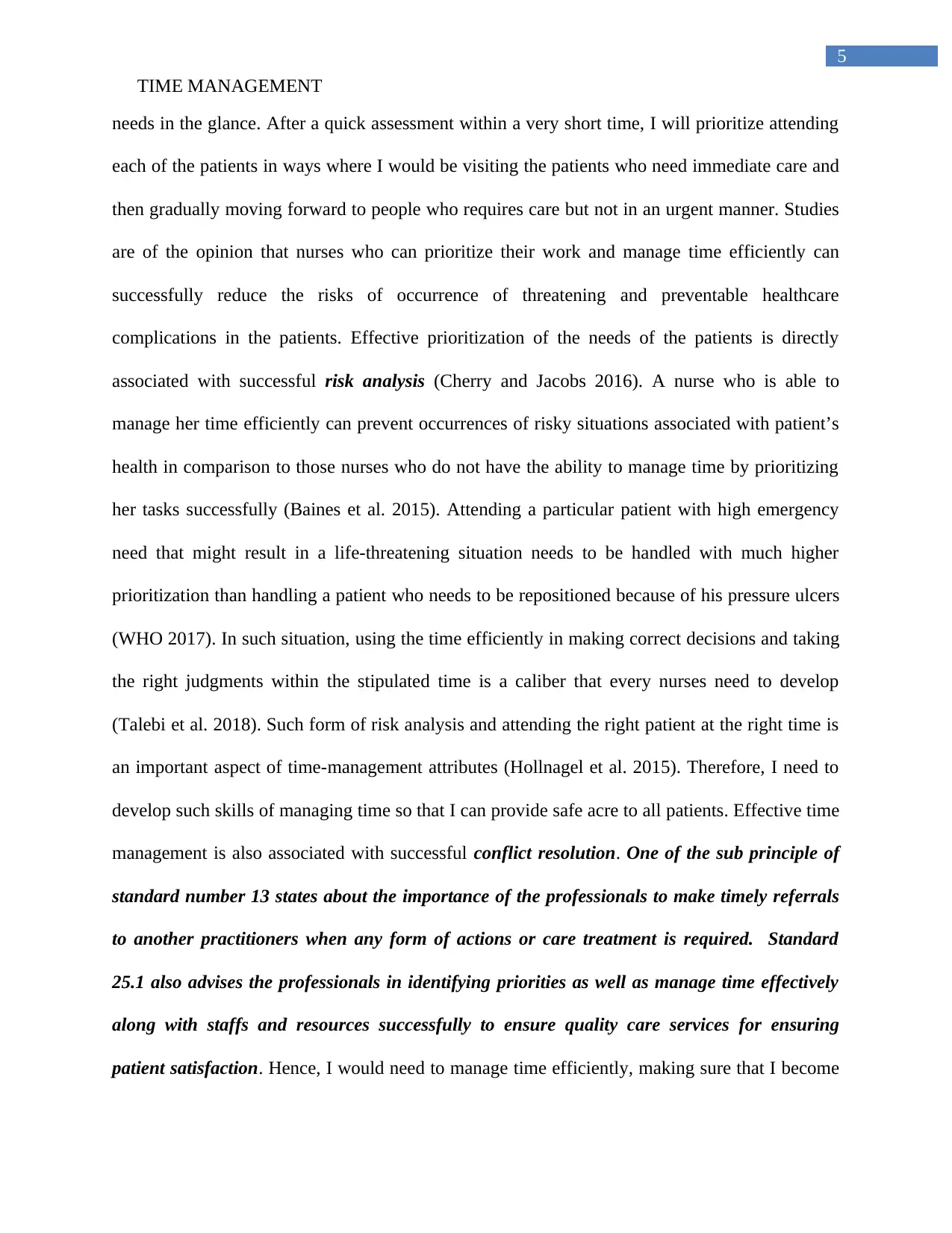
5
TIME MANAGEMENT
needs in the glance. After a quick assessment within a very short time, I will prioritize attending
each of the patients in ways where I would be visiting the patients who need immediate care and
then gradually moving forward to people who requires care but not in an urgent manner. Studies
are of the opinion that nurses who can prioritize their work and manage time efficiently can
successfully reduce the risks of occurrence of threatening and preventable healthcare
complications in the patients. Effective prioritization of the needs of the patients is directly
associated with successful risk analysis (Cherry and Jacobs 2016). A nurse who is able to
manage her time efficiently can prevent occurrences of risky situations associated with patient’s
health in comparison to those nurses who do not have the ability to manage time by prioritizing
her tasks successfully (Baines et al. 2015). Attending a particular patient with high emergency
need that might result in a life-threatening situation needs to be handled with much higher
prioritization than handling a patient who needs to be repositioned because of his pressure ulcers
(WHO 2017). In such situation, using the time efficiently in making correct decisions and taking
the right judgments within the stipulated time is a caliber that every nurses need to develop
(Talebi et al. 2018). Such form of risk analysis and attending the right patient at the right time is
an important aspect of time-management attributes (Hollnagel et al. 2015). Therefore, I need to
develop such skills of managing time so that I can provide safe acre to all patients. Effective time
management is also associated with successful conflict resolution. One of the sub principle of
standard number 13 states about the importance of the professionals to make timely referrals
to another practitioners when any form of actions or care treatment is required. Standard
25.1 also advises the professionals in identifying priorities as well as manage time effectively
along with staffs and resources successfully to ensure quality care services for ensuring
patient satisfaction. Hence, I would need to manage time efficiently, making sure that I become
TIME MANAGEMENT
needs in the glance. After a quick assessment within a very short time, I will prioritize attending
each of the patients in ways where I would be visiting the patients who need immediate care and
then gradually moving forward to people who requires care but not in an urgent manner. Studies
are of the opinion that nurses who can prioritize their work and manage time efficiently can
successfully reduce the risks of occurrence of threatening and preventable healthcare
complications in the patients. Effective prioritization of the needs of the patients is directly
associated with successful risk analysis (Cherry and Jacobs 2016). A nurse who is able to
manage her time efficiently can prevent occurrences of risky situations associated with patient’s
health in comparison to those nurses who do not have the ability to manage time by prioritizing
her tasks successfully (Baines et al. 2015). Attending a particular patient with high emergency
need that might result in a life-threatening situation needs to be handled with much higher
prioritization than handling a patient who needs to be repositioned because of his pressure ulcers
(WHO 2017). In such situation, using the time efficiently in making correct decisions and taking
the right judgments within the stipulated time is a caliber that every nurses need to develop
(Talebi et al. 2018). Such form of risk analysis and attending the right patient at the right time is
an important aspect of time-management attributes (Hollnagel et al. 2015). Therefore, I need to
develop such skills of managing time so that I can provide safe acre to all patients. Effective time
management is also associated with successful conflict resolution. One of the sub principle of
standard number 13 states about the importance of the professionals to make timely referrals
to another practitioners when any form of actions or care treatment is required. Standard
25.1 also advises the professionals in identifying priorities as well as manage time effectively
along with staffs and resources successfully to ensure quality care services for ensuring
patient satisfaction. Hence, I would need to manage time efficiently, making sure that I become
⊘ This is a preview!⊘
Do you want full access?
Subscribe today to unlock all pages.

Trusted by 1+ million students worldwide
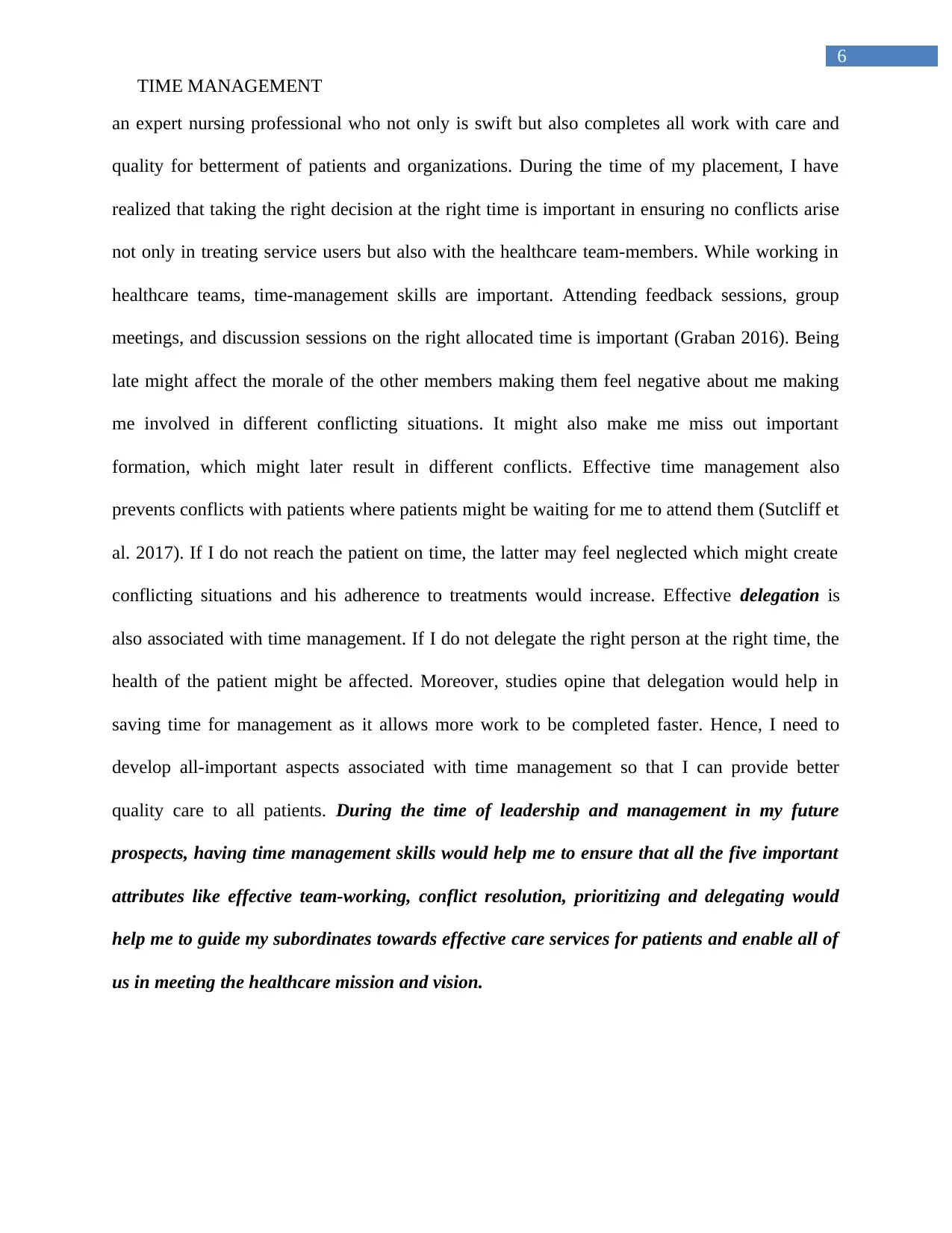
6
TIME MANAGEMENT
an expert nursing professional who not only is swift but also completes all work with care and
quality for betterment of patients and organizations. During the time of my placement, I have
realized that taking the right decision at the right time is important in ensuring no conflicts arise
not only in treating service users but also with the healthcare team-members. While working in
healthcare teams, time-management skills are important. Attending feedback sessions, group
meetings, and discussion sessions on the right allocated time is important (Graban 2016). Being
late might affect the morale of the other members making them feel negative about me making
me involved in different conflicting situations. It might also make me miss out important
formation, which might later result in different conflicts. Effective time management also
prevents conflicts with patients where patients might be waiting for me to attend them (Sutcliff et
al. 2017). If I do not reach the patient on time, the latter may feel neglected which might create
conflicting situations and his adherence to treatments would increase. Effective delegation is
also associated with time management. If I do not delegate the right person at the right time, the
health of the patient might be affected. Moreover, studies opine that delegation would help in
saving time for management as it allows more work to be completed faster. Hence, I need to
develop all-important aspects associated with time management so that I can provide better
quality care to all patients. During the time of leadership and management in my future
prospects, having time management skills would help me to ensure that all the five important
attributes like effective team-working, conflict resolution, prioritizing and delegating would
help me to guide my subordinates towards effective care services for patients and enable all of
us in meeting the healthcare mission and vision.
TIME MANAGEMENT
an expert nursing professional who not only is swift but also completes all work with care and
quality for betterment of patients and organizations. During the time of my placement, I have
realized that taking the right decision at the right time is important in ensuring no conflicts arise
not only in treating service users but also with the healthcare team-members. While working in
healthcare teams, time-management skills are important. Attending feedback sessions, group
meetings, and discussion sessions on the right allocated time is important (Graban 2016). Being
late might affect the morale of the other members making them feel negative about me making
me involved in different conflicting situations. It might also make me miss out important
formation, which might later result in different conflicts. Effective time management also
prevents conflicts with patients where patients might be waiting for me to attend them (Sutcliff et
al. 2017). If I do not reach the patient on time, the latter may feel neglected which might create
conflicting situations and his adherence to treatments would increase. Effective delegation is
also associated with time management. If I do not delegate the right person at the right time, the
health of the patient might be affected. Moreover, studies opine that delegation would help in
saving time for management as it allows more work to be completed faster. Hence, I need to
develop all-important aspects associated with time management so that I can provide better
quality care to all patients. During the time of leadership and management in my future
prospects, having time management skills would help me to ensure that all the five important
attributes like effective team-working, conflict resolution, prioritizing and delegating would
help me to guide my subordinates towards effective care services for patients and enable all of
us in meeting the healthcare mission and vision.
Paraphrase This Document
Need a fresh take? Get an instant paraphrase of this document with our AI Paraphraser
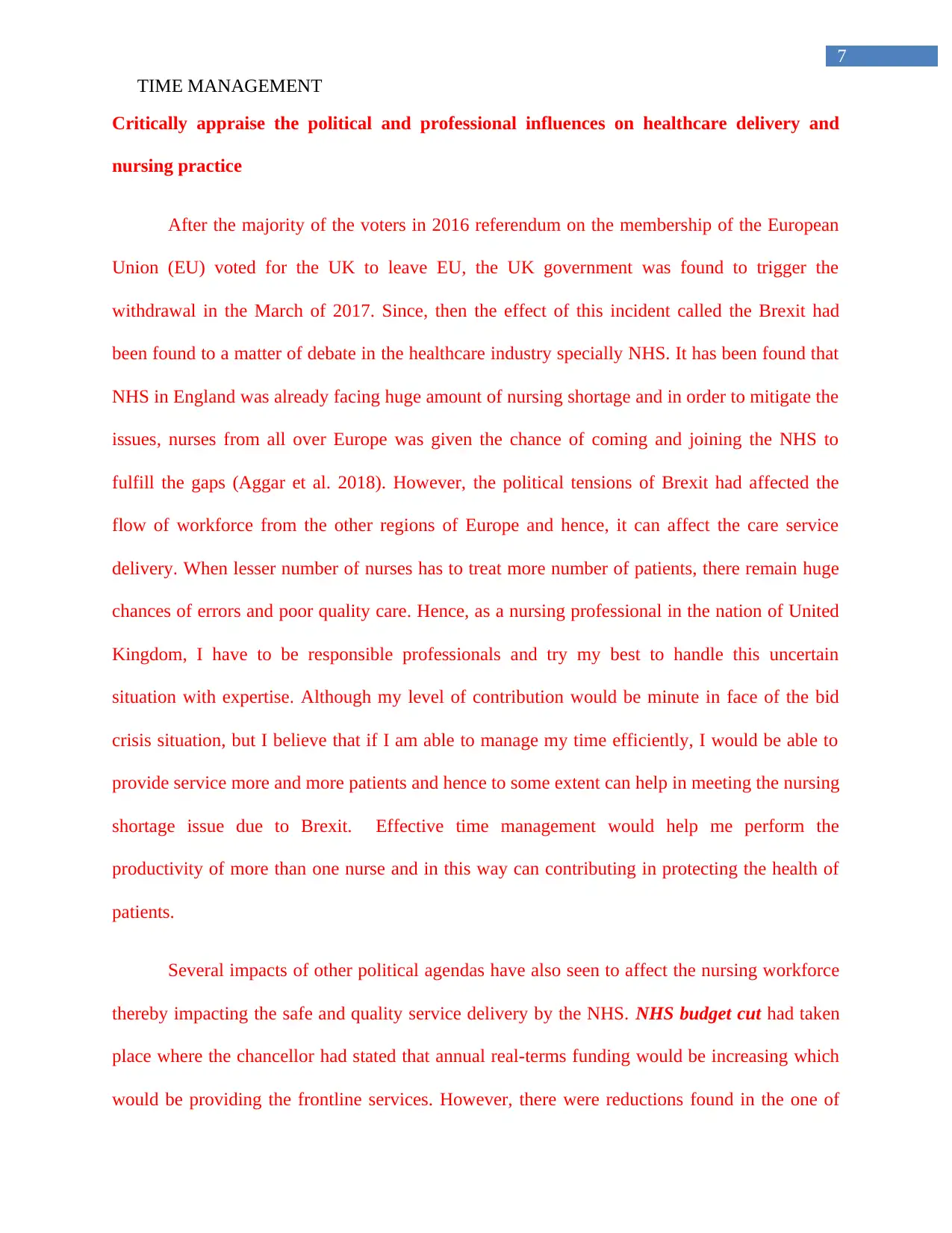
7
TIME MANAGEMENT
Critically appraise the political and professional influences on healthcare delivery and
nursing practice
After the majority of the voters in 2016 referendum on the membership of the European
Union (EU) voted for the UK to leave EU, the UK government was found to trigger the
withdrawal in the March of 2017. Since, then the effect of this incident called the Brexit had
been found to a matter of debate in the healthcare industry specially NHS. It has been found that
NHS in England was already facing huge amount of nursing shortage and in order to mitigate the
issues, nurses from all over Europe was given the chance of coming and joining the NHS to
fulfill the gaps (Aggar et al. 2018). However, the political tensions of Brexit had affected the
flow of workforce from the other regions of Europe and hence, it can affect the care service
delivery. When lesser number of nurses has to treat more number of patients, there remain huge
chances of errors and poor quality care. Hence, as a nursing professional in the nation of United
Kingdom, I have to be responsible professionals and try my best to handle this uncertain
situation with expertise. Although my level of contribution would be minute in face of the bid
crisis situation, but I believe that if I am able to manage my time efficiently, I would be able to
provide service more and more patients and hence to some extent can help in meeting the nursing
shortage issue due to Brexit. Effective time management would help me perform the
productivity of more than one nurse and in this way can contributing in protecting the health of
patients.
Several impacts of other political agendas have also seen to affect the nursing workforce
thereby impacting the safe and quality service delivery by the NHS. NHS budget cut had taken
place where the chancellor had stated that annual real-terms funding would be increasing which
would be providing the frontline services. However, there were reductions found in the one of
TIME MANAGEMENT
Critically appraise the political and professional influences on healthcare delivery and
nursing practice
After the majority of the voters in 2016 referendum on the membership of the European
Union (EU) voted for the UK to leave EU, the UK government was found to trigger the
withdrawal in the March of 2017. Since, then the effect of this incident called the Brexit had
been found to a matter of debate in the healthcare industry specially NHS. It has been found that
NHS in England was already facing huge amount of nursing shortage and in order to mitigate the
issues, nurses from all over Europe was given the chance of coming and joining the NHS to
fulfill the gaps (Aggar et al. 2018). However, the political tensions of Brexit had affected the
flow of workforce from the other regions of Europe and hence, it can affect the care service
delivery. When lesser number of nurses has to treat more number of patients, there remain huge
chances of errors and poor quality care. Hence, as a nursing professional in the nation of United
Kingdom, I have to be responsible professionals and try my best to handle this uncertain
situation with expertise. Although my level of contribution would be minute in face of the bid
crisis situation, but I believe that if I am able to manage my time efficiently, I would be able to
provide service more and more patients and hence to some extent can help in meeting the nursing
shortage issue due to Brexit. Effective time management would help me perform the
productivity of more than one nurse and in this way can contributing in protecting the health of
patients.
Several impacts of other political agendas have also seen to affect the nursing workforce
thereby impacting the safe and quality service delivery by the NHS. NHS budget cut had taken
place where the chancellor had stated that annual real-terms funding would be increasing which
would be providing the frontline services. However, there were reductions found in the one of
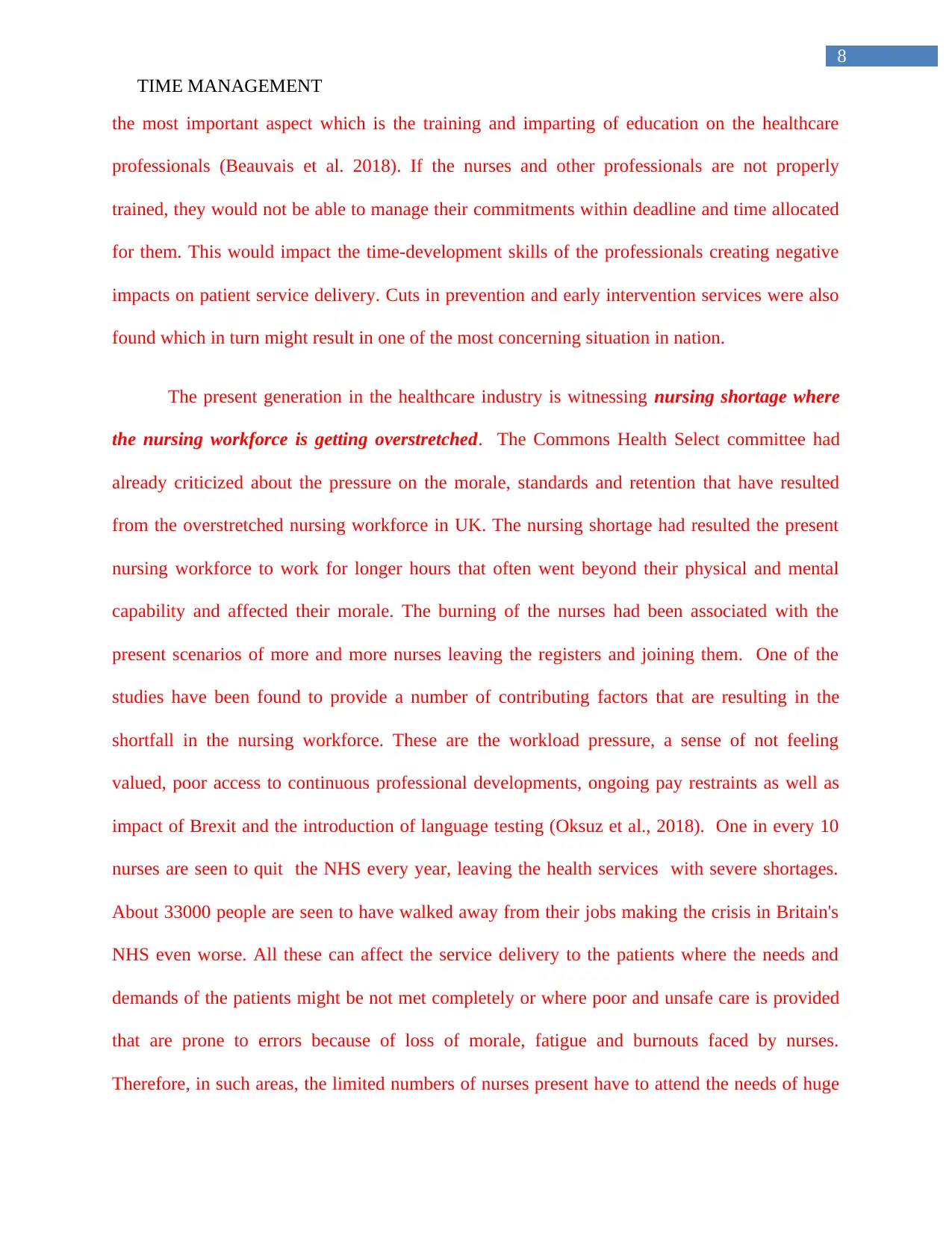
8
TIME MANAGEMENT
the most important aspect which is the training and imparting of education on the healthcare
professionals (Beauvais et al. 2018). If the nurses and other professionals are not properly
trained, they would not be able to manage their commitments within deadline and time allocated
for them. This would impact the time-development skills of the professionals creating negative
impacts on patient service delivery. Cuts in prevention and early intervention services were also
found which in turn might result in one of the most concerning situation in nation.
The present generation in the healthcare industry is witnessing nursing shortage where
the nursing workforce is getting overstretched. The Commons Health Select committee had
already criticized about the pressure on the morale, standards and retention that have resulted
from the overstretched nursing workforce in UK. The nursing shortage had resulted the present
nursing workforce to work for longer hours that often went beyond their physical and mental
capability and affected their morale. The burning of the nurses had been associated with the
present scenarios of more and more nurses leaving the registers and joining them. One of the
studies have been found to provide a number of contributing factors that are resulting in the
shortfall in the nursing workforce. These are the workload pressure, a sense of not feeling
valued, poor access to continuous professional developments, ongoing pay restraints as well as
impact of Brexit and the introduction of language testing (Oksuz et al., 2018). One in every 10
nurses are seen to quit the NHS every year, leaving the health services with severe shortages.
About 33000 people are seen to have walked away from their jobs making the crisis in Britain's
NHS even worse. All these can affect the service delivery to the patients where the needs and
demands of the patients might be not met completely or where poor and unsafe care is provided
that are prone to errors because of loss of morale, fatigue and burnouts faced by nurses.
Therefore, in such areas, the limited numbers of nurses present have to attend the needs of huge
TIME MANAGEMENT
the most important aspect which is the training and imparting of education on the healthcare
professionals (Beauvais et al. 2018). If the nurses and other professionals are not properly
trained, they would not be able to manage their commitments within deadline and time allocated
for them. This would impact the time-development skills of the professionals creating negative
impacts on patient service delivery. Cuts in prevention and early intervention services were also
found which in turn might result in one of the most concerning situation in nation.
The present generation in the healthcare industry is witnessing nursing shortage where
the nursing workforce is getting overstretched. The Commons Health Select committee had
already criticized about the pressure on the morale, standards and retention that have resulted
from the overstretched nursing workforce in UK. The nursing shortage had resulted the present
nursing workforce to work for longer hours that often went beyond their physical and mental
capability and affected their morale. The burning of the nurses had been associated with the
present scenarios of more and more nurses leaving the registers and joining them. One of the
studies have been found to provide a number of contributing factors that are resulting in the
shortfall in the nursing workforce. These are the workload pressure, a sense of not feeling
valued, poor access to continuous professional developments, ongoing pay restraints as well as
impact of Brexit and the introduction of language testing (Oksuz et al., 2018). One in every 10
nurses are seen to quit the NHS every year, leaving the health services with severe shortages.
About 33000 people are seen to have walked away from their jobs making the crisis in Britain's
NHS even worse. All these can affect the service delivery to the patients where the needs and
demands of the patients might be not met completely or where poor and unsafe care is provided
that are prone to errors because of loss of morale, fatigue and burnouts faced by nurses.
Therefore, in such areas, the limited numbers of nurses present have to attend the needs of huge
⊘ This is a preview!⊘
Do you want full access?
Subscribe today to unlock all pages.

Trusted by 1+ million students worldwide
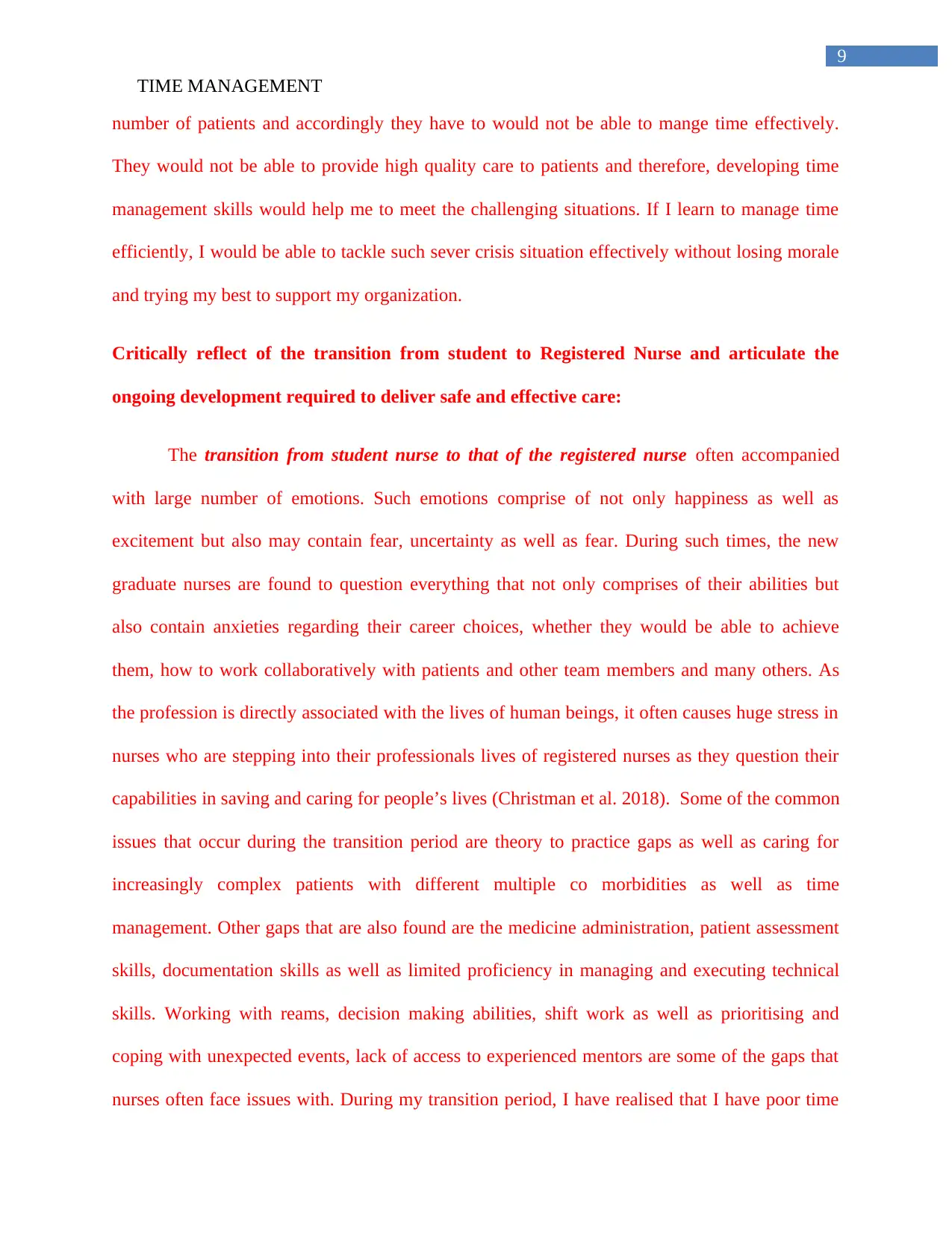
9
TIME MANAGEMENT
number of patients and accordingly they have to would not be able to mange time effectively.
They would not be able to provide high quality care to patients and therefore, developing time
management skills would help me to meet the challenging situations. If I learn to manage time
efficiently, I would be able to tackle such sever crisis situation effectively without losing morale
and trying my best to support my organization.
Critically reflect of the transition from student to Registered Nurse and articulate the
ongoing development required to deliver safe and effective care:
The transition from student nurse to that of the registered nurse often accompanied
with large number of emotions. Such emotions comprise of not only happiness as well as
excitement but also may contain fear, uncertainty as well as fear. During such times, the new
graduate nurses are found to question everything that not only comprises of their abilities but
also contain anxieties regarding their career choices, whether they would be able to achieve
them, how to work collaboratively with patients and other team members and many others. As
the profession is directly associated with the lives of human beings, it often causes huge stress in
nurses who are stepping into their professionals lives of registered nurses as they question their
capabilities in saving and caring for people’s lives (Christman et al. 2018). Some of the common
issues that occur during the transition period are theory to practice gaps as well as caring for
increasingly complex patients with different multiple co morbidities as well as time
management. Other gaps that are also found are the medicine administration, patient assessment
skills, documentation skills as well as limited proficiency in managing and executing technical
skills. Working with reams, decision making abilities, shift work as well as prioritising and
coping with unexpected events, lack of access to experienced mentors are some of the gaps that
nurses often face issues with. During my transition period, I have realised that I have poor time
TIME MANAGEMENT
number of patients and accordingly they have to would not be able to mange time effectively.
They would not be able to provide high quality care to patients and therefore, developing time
management skills would help me to meet the challenging situations. If I learn to manage time
efficiently, I would be able to tackle such sever crisis situation effectively without losing morale
and trying my best to support my organization.
Critically reflect of the transition from student to Registered Nurse and articulate the
ongoing development required to deliver safe and effective care:
The transition from student nurse to that of the registered nurse often accompanied
with large number of emotions. Such emotions comprise of not only happiness as well as
excitement but also may contain fear, uncertainty as well as fear. During such times, the new
graduate nurses are found to question everything that not only comprises of their abilities but
also contain anxieties regarding their career choices, whether they would be able to achieve
them, how to work collaboratively with patients and other team members and many others. As
the profession is directly associated with the lives of human beings, it often causes huge stress in
nurses who are stepping into their professionals lives of registered nurses as they question their
capabilities in saving and caring for people’s lives (Christman et al. 2018). Some of the common
issues that occur during the transition period are theory to practice gaps as well as caring for
increasingly complex patients with different multiple co morbidities as well as time
management. Other gaps that are also found are the medicine administration, patient assessment
skills, documentation skills as well as limited proficiency in managing and executing technical
skills. Working with reams, decision making abilities, shift work as well as prioritising and
coping with unexpected events, lack of access to experienced mentors are some of the gaps that
nurses often face issues with. During my transition period, I have realised that I have poor time
Paraphrase This Document
Need a fresh take? Get an instant paraphrase of this document with our AI Paraphraser
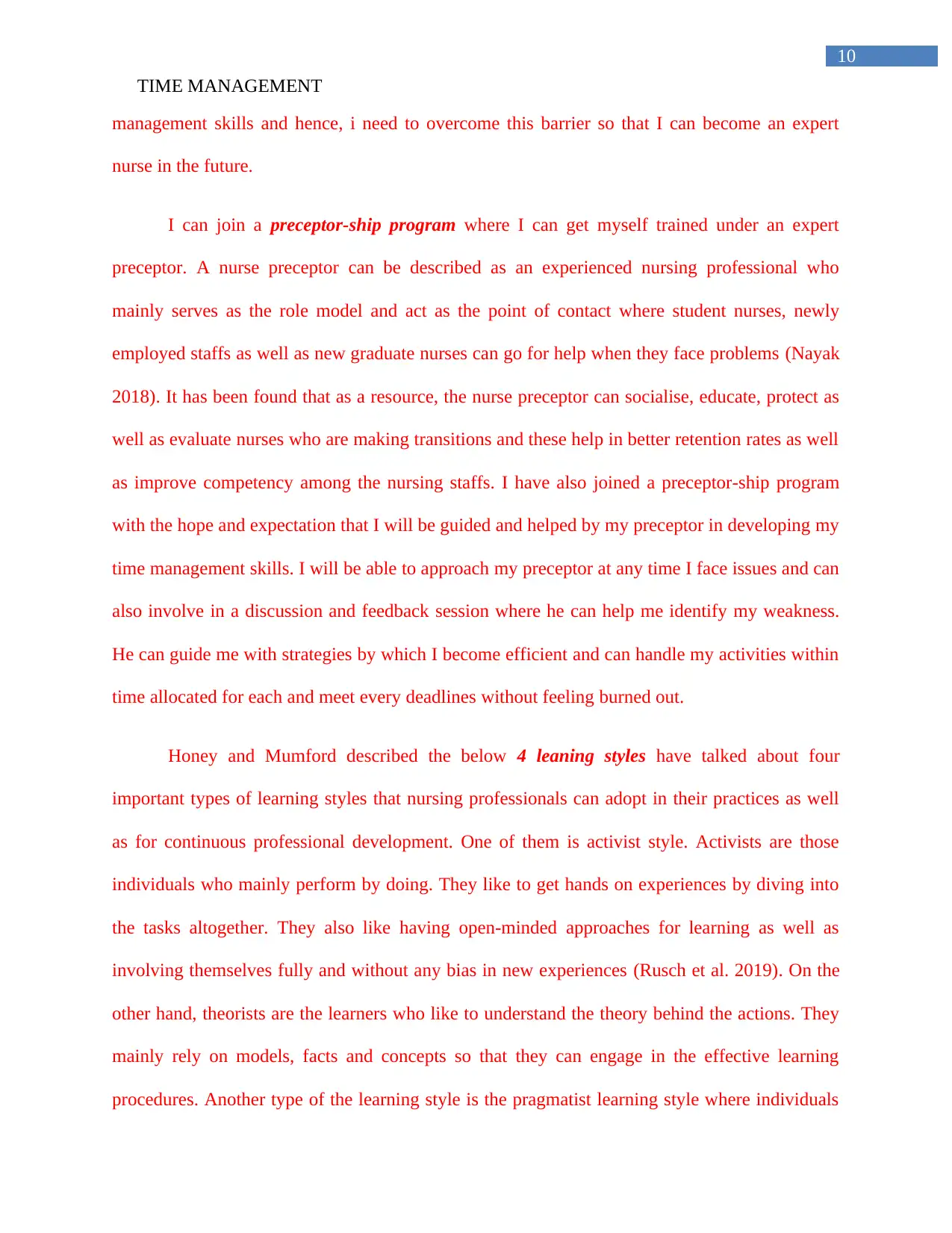
10
TIME MANAGEMENT
management skills and hence, i need to overcome this barrier so that I can become an expert
nurse in the future.
I can join a preceptor-ship program where I can get myself trained under an expert
preceptor. A nurse preceptor can be described as an experienced nursing professional who
mainly serves as the role model and act as the point of contact where student nurses, newly
employed staffs as well as new graduate nurses can go for help when they face problems (Nayak
2018). It has been found that as a resource, the nurse preceptor can socialise, educate, protect as
well as evaluate nurses who are making transitions and these help in better retention rates as well
as improve competency among the nursing staffs. I have also joined a preceptor-ship program
with the hope and expectation that I will be guided and helped by my preceptor in developing my
time management skills. I will be able to approach my preceptor at any time I face issues and can
also involve in a discussion and feedback session where he can help me identify my weakness.
He can guide me with strategies by which I become efficient and can handle my activities within
time allocated for each and meet every deadlines without feeling burned out.
Honey and Mumford described the below 4 leaning styles have talked about four
important types of learning styles that nursing professionals can adopt in their practices as well
as for continuous professional development. One of them is activist style. Activists are those
individuals who mainly perform by doing. They like to get hands on experiences by diving into
the tasks altogether. They also like having open-minded approaches for learning as well as
involving themselves fully and without any bias in new experiences (Rusch et al. 2019). On the
other hand, theorists are the learners who like to understand the theory behind the actions. They
mainly rely on models, facts and concepts so that they can engage in the effective learning
procedures. Another type of the learning style is the pragmatist learning style where individuals
TIME MANAGEMENT
management skills and hence, i need to overcome this barrier so that I can become an expert
nurse in the future.
I can join a preceptor-ship program where I can get myself trained under an expert
preceptor. A nurse preceptor can be described as an experienced nursing professional who
mainly serves as the role model and act as the point of contact where student nurses, newly
employed staffs as well as new graduate nurses can go for help when they face problems (Nayak
2018). It has been found that as a resource, the nurse preceptor can socialise, educate, protect as
well as evaluate nurses who are making transitions and these help in better retention rates as well
as improve competency among the nursing staffs. I have also joined a preceptor-ship program
with the hope and expectation that I will be guided and helped by my preceptor in developing my
time management skills. I will be able to approach my preceptor at any time I face issues and can
also involve in a discussion and feedback session where he can help me identify my weakness.
He can guide me with strategies by which I become efficient and can handle my activities within
time allocated for each and meet every deadlines without feeling burned out.
Honey and Mumford described the below 4 leaning styles have talked about four
important types of learning styles that nursing professionals can adopt in their practices as well
as for continuous professional development. One of them is activist style. Activists are those
individuals who mainly perform by doing. They like to get hands on experiences by diving into
the tasks altogether. They also like having open-minded approaches for learning as well as
involving themselves fully and without any bias in new experiences (Rusch et al. 2019). On the
other hand, theorists are the learners who like to understand the theory behind the actions. They
mainly rely on models, facts and concepts so that they can engage in the effective learning
procedures. Another type of the learning style is the pragmatist learning style where individuals
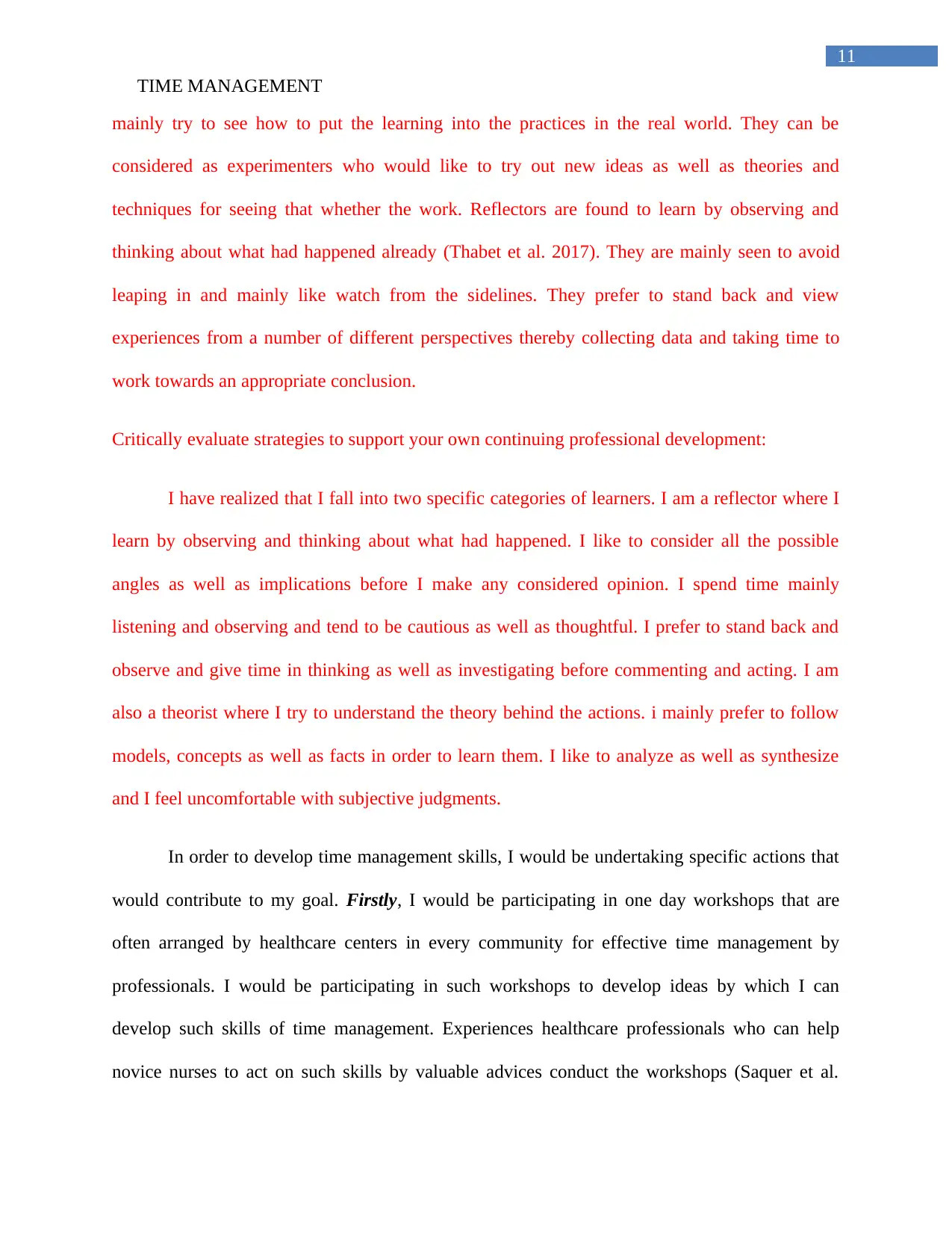
11
TIME MANAGEMENT
mainly try to see how to put the learning into the practices in the real world. They can be
considered as experimenters who would like to try out new ideas as well as theories and
techniques for seeing that whether the work. Reflectors are found to learn by observing and
thinking about what had happened already (Thabet et al. 2017). They are mainly seen to avoid
leaping in and mainly like watch from the sidelines. They prefer to stand back and view
experiences from a number of different perspectives thereby collecting data and taking time to
work towards an appropriate conclusion.
Critically evaluate strategies to support your own continuing professional development:
I have realized that I fall into two specific categories of learners. I am a reflector where I
learn by observing and thinking about what had happened. I like to consider all the possible
angles as well as implications before I make any considered opinion. I spend time mainly
listening and observing and tend to be cautious as well as thoughtful. I prefer to stand back and
observe and give time in thinking as well as investigating before commenting and acting. I am
also a theorist where I try to understand the theory behind the actions. i mainly prefer to follow
models, concepts as well as facts in order to learn them. I like to analyze as well as synthesize
and I feel uncomfortable with subjective judgments.
In order to develop time management skills, I would be undertaking specific actions that
would contribute to my goal. Firstly, I would be participating in one day workshops that are
often arranged by healthcare centers in every community for effective time management by
professionals. I would be participating in such workshops to develop ideas by which I can
develop such skills of time management. Experiences healthcare professionals who can help
novice nurses to act on such skills by valuable advices conduct the workshops (Saquer et al.
TIME MANAGEMENT
mainly try to see how to put the learning into the practices in the real world. They can be
considered as experimenters who would like to try out new ideas as well as theories and
techniques for seeing that whether the work. Reflectors are found to learn by observing and
thinking about what had happened already (Thabet et al. 2017). They are mainly seen to avoid
leaping in and mainly like watch from the sidelines. They prefer to stand back and view
experiences from a number of different perspectives thereby collecting data and taking time to
work towards an appropriate conclusion.
Critically evaluate strategies to support your own continuing professional development:
I have realized that I fall into two specific categories of learners. I am a reflector where I
learn by observing and thinking about what had happened. I like to consider all the possible
angles as well as implications before I make any considered opinion. I spend time mainly
listening and observing and tend to be cautious as well as thoughtful. I prefer to stand back and
observe and give time in thinking as well as investigating before commenting and acting. I am
also a theorist where I try to understand the theory behind the actions. i mainly prefer to follow
models, concepts as well as facts in order to learn them. I like to analyze as well as synthesize
and I feel uncomfortable with subjective judgments.
In order to develop time management skills, I would be undertaking specific actions that
would contribute to my goal. Firstly, I would be participating in one day workshops that are
often arranged by healthcare centers in every community for effective time management by
professionals. I would be participating in such workshops to develop ideas by which I can
develop such skills of time management. Experiences healthcare professionals who can help
novice nurses to act on such skills by valuable advices conduct the workshops (Saquer et al.
⊘ This is a preview!⊘
Do you want full access?
Subscribe today to unlock all pages.

Trusted by 1+ million students worldwide
1 out of 17
Related Documents
Your All-in-One AI-Powered Toolkit for Academic Success.
+13062052269
info@desklib.com
Available 24*7 on WhatsApp / Email
![[object Object]](/_next/static/media/star-bottom.7253800d.svg)
Unlock your academic potential
Copyright © 2020–2026 A2Z Services. All Rights Reserved. Developed and managed by ZUCOL.





